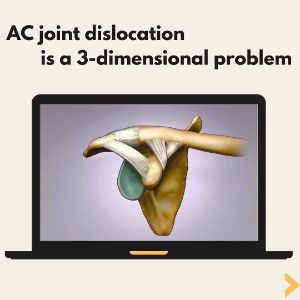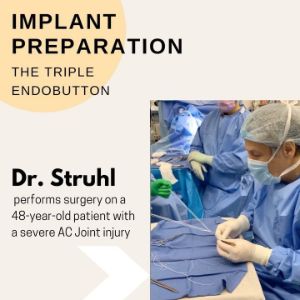Surgical Technique
Triple Endobutton Surgical Technique
Triple Endobutton Construct
Closed-Loop Double Cortical Button Technique for AC Joint Dislocations
Mechanism of injury
Correct mechanism of injury
Incorrect mechanism of injury
Clinical demonstration of the mechanism of injury
This video shows a patient with a severe chronic AC joint dislocation. In this video the deformity is being corrected by pushing UP on the elbow, not pushing down on the clavicle. This demonstration emphasizes and underscores the point that the joint dislocates when the scapula is pushed down and restoring a normal joint requires pushing it back UP. While the clavicle is prominent after a dislocation is actually not “sticking up”. Its the shoulder that has dropped away!
The importance of Understanding the Mechanism of Injury — Why the Triple Endobutton Technique succeeds where others fail
AC Joint Medial Instability After Injury
Medial Drift of the Acromion and AC Joint Dislocation
An AC joint dislocation not only causes instability in the vertical plane but more importantly the horizontal plane as well. This video shows the pathologic movement of the acromion medially when the patient moves the arm across the body. This pathologic medial drift of the acromion is a significant cause of pain in patients with an AC joint dislocation and failure to correct this instability pattern when reconstructing the joint surgically will reliably lead to failure and implant pull-out or tendon graft ruptures in the post-operative period.




